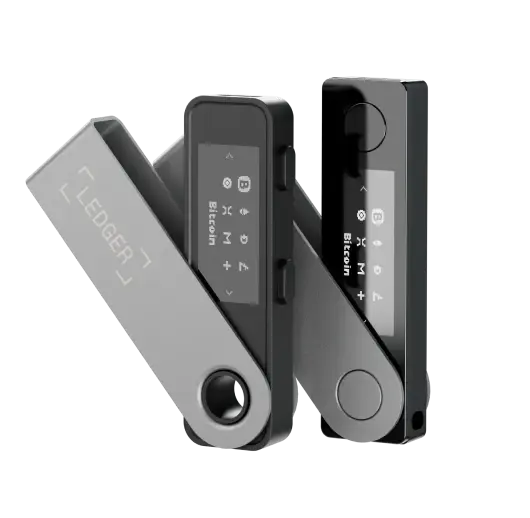Compare Ledger signers
Get a Ledger Nano
Select and purchase a Ledger hardware wallet of your choice.
- Beginner in the crypto world? Get started with Ledger Nano S Plus.
- Prefer a Bluetooth connection? Try with Ledger Nano X.
Looking for a Qtum Wallet to buy and store your Qtum? Join 7+ million customers who trust Ledger hardware wallets to securely store their crypto and use them on the day-to-day basis.
Trusted by over 8 million customers

Whether you’re looking to keep your crypto safe for long-term or manage them on a daily basis, Ledger has the right product for you.
Ledger hardware wallet
Ledger hardware wallet stores your private keys and signs transactions offline, making them resistant to malicious attacks and threats. Pair the Ledger crypto wallet with Ledger Live App to manage your Qtum on the go.
Ledger Live App
Ledger Live App is a gateway to manage your assets, checking your real-time balance, tracking transaction histories, and more.

Select and purchase a Ledger hardware wallet of your choice.

Download and install the Ledger Live app in a couple of clicks on desktop and mobile.
Coupled with a Ledger, it makes the most secured wallet for your Qtum.

Add a Qtum account with a couple of clicks. Choose among different providers and easily manage your Qtum.
And not only Qtum. With Ledger Live, you can manage thousands of crypto and a large variety of NFTs.

The most premium secure touchscreen hardware wallet to protect and manage your Qtum.

Designed with accessible sizing, enjoy the all new secure touchscreen user experience to manage your Qtum.

Our classic entry-level hardware wallets built with all the essentials to secure your Qtum.

With Ledger Live coupled with a Ledger, you can:
*Buy, send/receive, swap, stake, and other crypto transaction services are provided by third-parties provider, which availability may vary based on jurisdiction/territory.

Swapping allows you to explore different crypto assets, protect your Qtum from volatility, and diversify your portfolio.
You can easily swap Qtum through Ledger Live without using fiat currencies.

Qtum is a decentralized blockchain network that supports smart contracts using the Ethereum Virtual Machine. The blockchain itself is based on Bitcoin’s UTXO model, but uses proof-of-stake for consensus. Because Qtum is a hybrid project that takes the best parts of Ethereum and Bitcoin, it also has the ability to merge future updates from these projects and place them on top of the Team’s own unique developments.
Anyone can participate in the transaction validation process, all they require is an internet connection and a device that can run a node. There’s no need to hold coins or vote for a centralized validator. Block targets are set to average 32 seconds, and up to 8000kb of data can be stored in each block. Bundled with SegWit, it’s possible to achieve 1100 transactions per second. Because Qtum is based on Bitcoin, if necessary, a Layer2 network can push this throughput to “millions or billions” of transactions per second with Lightning.
The Qtum project supports multiple token standards, including its own implementation of Ethereum’s ERC-20, dubbed QRC-20. Qtum also integrated the BRC-20 standard that appeared on Bitcoin, dubbing it qBRC-20. Along with NFT support, Qtum offers developers more than Bitcoin or Ethereum can do independently. Qtum is connected to the network of blockchains through a bridge to Ethereum, allowing stablecoins and ERC-20 tokens to be transferred back and forth between chains.
Find answers to some of the most common questions.
Related Resources